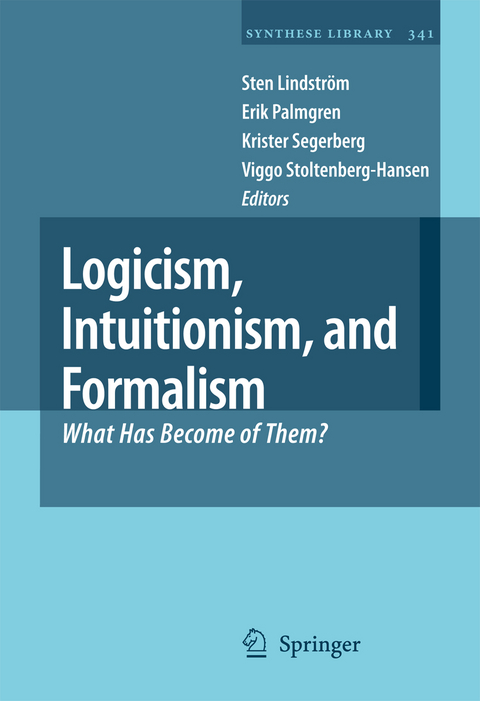
Logicism, Intuitionism, and Formalism
Springer (Verlag)
978-90-481-8029-5 (ISBN)
The present anthology has its origin in two international conferences that were arranged at Uppsala University in August 2004: "Logicism, Intuitionism and F- malism: What has become of them?" followed by "Symposium on Constructive Mathematics". The rst conference concerned the three major programmes in the foundations of mathematics during the classical period from Frege's Begrif- schrift in 1879 to the publication of Godel' .. s two incompleteness theorems in 1931: The logicism of Frege, Russell and Whitehead, the intuitionism of Brouwer, and Hilbert's formalist and proof-theoretic programme. The main purpose of the conf- ence was to assess the relevance of these foundational programmes to contemporary philosophy of mathematics. The second conference was announced as a satellite event to the rst, and was speci cally concerned with constructive mathematics-an activebranchofmathematicswheremathematicalstatements-existencestatements in particular-are interpreted in terms of what can be effectively constructed. C- structive mathematics may also be characterized as mathematics based on intuiti- isticlogicand,thus,beviewedasadirectdescendant ofBrouwer'sintuitionism.
The two conferences were successful in bringing together a number of internationally renowned mathematicians and philosophers around common concerns. Once again it was con rmed that philosophers and mathematicians can work together and that real progress in the philosophy and foundations of mathematics is possible only if they do. Most of the papers in this collection originate from the two conferences, but a few additional papers of relevance to the issues discussed at the Uppsala c- ferences have been solicited especially for this volume.
Sten Lindström is Professor of Philosophy at Umeå University and has been a Research Fellow at the Swedish Collegium for Advanced Study (SCAS). He has published papers on intensional logic, belief revision and philosophy of language, and co-edited the books Logic, Action and Cognition: Essays in Philosophical Logic (Kluwer, 1997) and Collected Papers of Stig Kanger with Essays on his Life and Work, I-II (Kluwer, 2001). Erik Palmgren is Professor of Mathematics at Uppsala University. His research interests are mainly mathematical logic and the foundations of mathematics. He is presently working on the foundational programme of replacing impredicative constructions by inductive constructions in mathematics, with special emphasis on point-free topology and topos theory. Krister Segerberg is Emeritus Professor of Philosophy at Uppsala University and the University of Auckland. He is the author of papers in modal logic, the logic of action, belief revision and deontic logic, as well as the books An Essay in Classical Modal Logic (1971) and Classical Propositional Operators: An Exercise in the Foundations of Logic (1982). Viggo Stoltenberg-Hansen is professor of Mathematical Logic at Uppsala University. His main interests include computability and constructivity in mathematics.
Introduction: The Three Foundational Programmes.- Introduction: The Three Foundational Programmes.- Logicism and Neo-Logicism.- Protocol Sentences for Lite Logicism.- Frege’s Context Principle and Reference to Natural Numbers.- The Measure of Scottish Neo-Logicism.- Natural Logicism via the Logic of Orderly Pairing.- Intuitionism and Constructive Mathematics.- A Constructive Version of the Lusin Separation Theorem.- Dini’s Theorem in the Light of Reverse Mathematics.- Journey into Apartness Space.- Relativization of Real Numbers to a Universe.- 100 Years of Zermelo’s Axiom of Choice: What was the Problem with It?.- Intuitionism and the Anti-Justification of Bivalence.- From Intuitionistic to Point-Free Topology: On the Foundation of Homotopy Theory.- Program Extraction in Constructive Analysis.- Brouwer’s Approximate Fixed-Point Theorem is Equivalent to Brouwer’s Fan Theorem.- Formalism.- “Gödel’s Modernism: On Set-Theoretic Incompleteness,” Revisited.- Tarski’s Practice and Philosophy: Between Formalism and Pragmatism.- The Constructive Hilbert Program and the Limits of Martin-Löf Type Theory.- Categories, Structures, and the Frege-Hilbert Controversy: The Status of Meta-mathematics.- Beyond Hilbert’s Reach?.- Hilbert and the Problem of Clarifying the Infinite.
| Erscheint lt. Verlag | 28.10.2010 |
|---|---|
| Reihe/Serie | Synthese Library ; 341 |
| Zusatzinfo | XII, 512 p. |
| Verlagsort | Dordrecht |
| Sprache | englisch |
| Maße | 155 x 235 mm |
| Themenwelt | Geisteswissenschaften ► Philosophie ► Erkenntnistheorie / Wissenschaftstheorie |
| Geisteswissenschaften ► Philosophie ► Logik | |
| Geisteswissenschaften ► Philosophie ► Metaphysik / Ontologie | |
| Geisteswissenschaften ► Philosophie ► Sprachphilosophie | |
| Mathematik / Informatik ► Mathematik ► Allgemeines / Lexika | |
| Mathematik / Informatik ► Mathematik ► Geschichte der Mathematik | |
| Mathematik / Informatik ► Mathematik ► Logik / Mengenlehre | |
| ISBN-10 | 90-481-8029-5 / 9048180295 |
| ISBN-13 | 978-90-481-8029-5 / 9789048180295 |
| Zustand | Neuware |
| Haben Sie eine Frage zum Produkt? |
aus dem Bereich


![Was heißt Denken?. Vorlesung Wintersemester 1951/52. [Was bedeutet das alles?] - Martin Heidegger](/media/113619842)